最新高一必修三语法(名词性从句)
高一英语人教版新课标必修三单元《语法名词性从句》
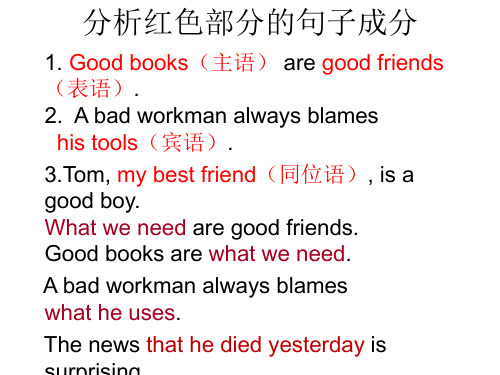
5. Did she say___________________________( how we should do the work 我们
应该怎么做这个工作)?
Fill in the blanks with suitable conjunctions.
1. ---Can you tell me _____ who the man is ? --- He is my brother. when he was coming until 2. I didn't know _____ yesterday. what 3. The doctor asks ____ medicine you have taken.
同位语从句
根据名词性从句所处的位置来确定从句的类型 1) 主语从句 + 谓语 + 其它成分 2) 主语 + 连系V + 表语从句 3) ① 主语 + 谓语(Vt.)+ 宾语从句 ② 主语 + 谓语 (+ … ) + 介词 + 宾语从句 4) ①主语(抽象名词)+ 同位语从句 + 谓语+ 其它成分 ②主语 + 谓语 + 宾语(抽象名词)+ 同位语 从句
Exercise 3:
that 1.The reason why he was late was _____he missed the train by one minute this morning. whether we can make good 2.The question is _____________________ preparation __________(我们是否能做好准备)in such a short time. which dictionary I 3.What I want to know is _________________ should buy 我该买哪部词典). _________( when you can finish it. (你什么 4.The point is __________________ 时候可以完成)
高中必修三 unit 3 grammar 名词性从句

She said (that) she would never come back again.
注意:一般情况下只能接wh-类连接词引导的宾语 从句。少数几个介词如excerpt, but, in 后可接that 引导的宾语从句。
引导名词性从句的连接词可分为三类:
一、从属连词(5个): that; whether, if ; (均表示“是否”表明从句内容的不确定性 as if ,as though . (均表示“好像”,“似乎”)
二,连接代词(9个): what, whatever, who, whoever, whom, whomever, whose, which, whichever
(2)that没有任何实义,而what可翻译为 什么;
(3)what 任何时候不可省略,而that在引 导宾语从句时可以省略。
关联词的功能; a. 连词 b.充当成分 c.具有一定实义 那么,其中从属连词有_a___;
连接代词和连接副词有_____b_. c
宾语从句可分为三种类型:
1.由从属连词that引导的宾语从句表述陈述意思, 连词that通常可以省略。
三,连接副词(7个): when, where, how, why, whenever, wherever, however
Group one
I don’t know what we will do next.
I don’t know where we will go this afternoon.
在句子中起名词作用的句子叫 名词性从句 (Nominal Clauses)。 名词性从句的功能相当于名词词 组,它在复合句中中能担任主语、 宾语、表语、同位语等,因此根据 它在句中不同的语法功能,名词性 从句又可分别称为主__语__从__句__,__宾__语__从__句__, _表__语__从__句___和_同__位__语___从__句.
高一英语必修3名词性从句讲解
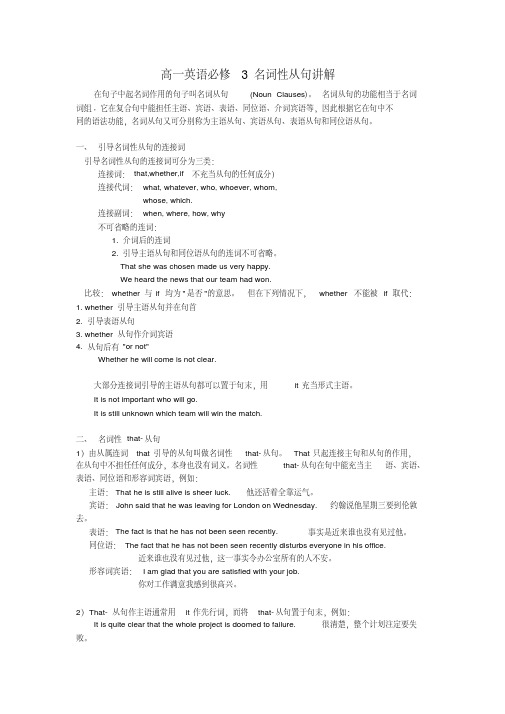
高一英语必修3名词性从句讲解在句子中起名词作用的句子叫名词从句(Noun Clauses)。
名词从句的功能相当于名词词组, 它在复合句中能担任主语、宾语、表语、同位语、介词宾语等,因此根据它在句中不同的语法功能,名词从句又可分别称为主语从句、宾语从句、表语从句和同位语从句。
一、引导名词性从句的连接词引导名词性从句的连接词可分为三类:连接词:that,whether,if 不充当从句的任何成分)连接代词:what, whatever, who, whoever, whom,whose, which.连接副词:when, where, how, why不可省略的连词:1. 介词后的连词2. 引导主语从句和同位语从句的连词不可省略。
That she was chosen made us very happy.We heard the news that our team had won.比较:whether与if 均为"是否"的意思。
但在下列情况下,whether 不能被if 取代:1. whether引导主语从句并在句首2. 引导表语从句3. whether从句作介词宾语4. 从句后有"or not"Whether he will come is not clear.大部分连接词引导的主语从句都可以置于句末,用it充当形式主语。
It is not important who will go.It is still unknown which team will win the match.二、名词性that-从句1)由从属连词that引导的从句叫做名词性that-从句。
That只起连接主句和从句的作用,在从句中不担任任何成分,本身也没有词义。
名词性that-从句在句中能充当主语、宾语、表语、同位语和形容词宾语,例如:主语:That he is still alive is sheer luck.他还活着全靠运气。
必修三语法-名词性从句

名词性从句的作用相当于名词,因此主语从 句、表语从句 、宾语从句和同位语从句分别 作主句的主语、表语、宾语和同位语。
Who will win the match is still unknown. 主语从句
常用并列连词:
并列句
• 平行并列连词:
and, both…and, not only… but also, neither…nor
• 转折并列连词: but, however, while, yet,
• 因果并列连词: for, so
• 选择并列连词: or,either…or
名词性从句 主表语语复从从合句句((句SP:ur主ebdjeicc句attCiv+lea从uCsleas句u)ses) 宾名语词从句性(从Ob句ject Clauses)
➢ I turned on the TV and my sister and I watched it.
I bought my sister a present. She didn’t like it.
➢I bought my sister a present, but she didn’t like it.
主语
What he does is important.
{ 表语 This is his job. This is what he does every day.
宾 I don’t like his job. 语 I don’t like what he does every day.
同 I don’t know about the man, Mr. White. 位
人教版新课标高一英语必修3 Unit 3-4-5名词性从句总讲解和练习
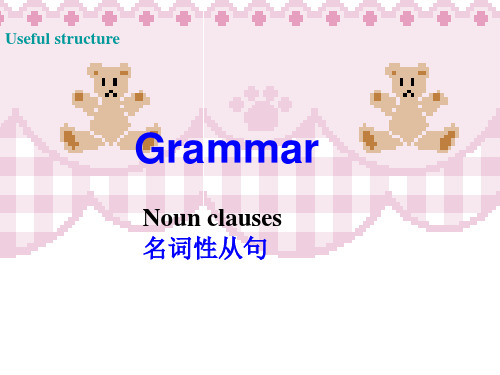
注意事项(时态呼应)
主句时态
从句时态
现在时/将来时
相应任何时态 相应过去任何时态(但
过去时
客观真理和自然规律的
内容时态不变,仍用一 般现在时)
• 注意: • 1) 在非正式文体中,若that 引导的宾语从句 较短,that 一般可省略。 • 如:He said (that)all the students should help each other. • 但当that 从句与主句谓语动词之间有插入语 或者与从句主语之间有插入语时,that 不可
引导宾语从句时可互换. 位于介词后要用whether. 位于句首时要用whether. 引导表语从句, 主语从句, 同位语从句时, 要用 whether. E. 后+to do 时用whether F. 后+or not 时用whether A. B. C. D.
what / that
• 1. I think (that) it is unnecessary for me to speak louder. 2. His mother is satisfied with what he has done. • 3. That he was able to come made us happy. what makes us interested. • 4. This is _____ that • 5. The reason was________ Tod had never seen the million pound note before.
The Object Clause
做动词的宾语 (1)大部分宾语从句直接跟在动词后:
e.g. He doesn't know where the post office is.
必修三英语语法-名词性从句
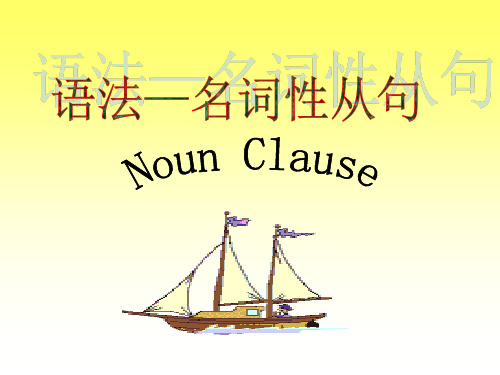
主语、表语
(无论)谁(指人)
宾语
特
谁的(指人)
定语、表语
殊
(无论)什么(事物) 主语、宾语、表语、定语 疑
(无论)哪个(人或物) 主语、宾语、表语、定语 问
(无论)什么时候
时间状语
句
(无论)在哪
地点状语
(无论)怎样 为什么
方式状语 原因状语
what + n.
多么 ......
主语、宾语、表语
感叹句
how + adj./ adv.
英语句子结构概论 英语句子的种类
简单句 (simple sentence)
并列句 (compound sentence) 复合句 (complex sentence)
并列句
把两个或几个简单句用并列连词连接起来。
I turned on the TV. My sister and 并I w列a句tched it.
➢ I turned on the TV and my sister and I watched it.
I bought my sister a present. She didn’t like it.
➢I bought my sister a present, but she didn’t like it.
2. Because it is raining , we have to stay at home. 状语从句
3. I know (that) he is from America. 名词性从句--- (宾语从句)
从句的特征
• 1、有引导词/ 从属连词引导(个别可省略);
• 2、有完整正确的谓语动词(注意时态呼应、 主谓一致、虚拟语气等);
必修三Unit3语法名词性从句
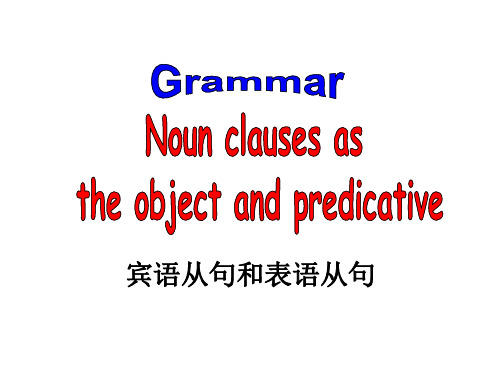
2. 疑问词引导的名词性从句要求使用 陈述句语序,不能用一般疑问句语 序。 他是怎么成功的仍然是个谜。
How was he successful is still a puzzle. (F ) How he was successful is still a puzzle. (T )
二、名词性从句连接词的选用
解析:这是一个宾语从句,wants后面缺少 宾语,always give the monkey exactly what he wants是一句谚语,意思是"永远 给予他人他确实想要的东西"。故答案为 A。
2.---I drove to Zhuhai for the air show last week.
---Is that___A____ you had a few days
off?
A.why B.when C.what D.where
解析:这是一个由why引导的表语从句, 表示原因.这句话的意思是"这就是你离 开的原因吗?"。故答案为A。
if / whether 1. I asked her _if_/__w_h_e_t_h_e_r she had a bike.
3. We’re worried about _w_h_e_t_h_e_r_ he is safe.
4. I don’t know _w_h_e_t_h_e_r_/i_f__ he is well or not.
如:
1.The fact is that our team has won the game.
2.The truth is that she was the very person who informed against her husband.
高中英语必修三unit4-语法名词性从句PPT课件

2)Whether it will please them is not easy to say.
*hether 是否,表不确定的事情(不能用If)
3) What we need is more practice.
*what 在从句中作主语
4)When we will begin the meeting is under
Joke1: What you want is a television set.
主语从句
Joke 2: If my wish that the dancers can grow taller comes true one day, they will not have to stand on their toes all the time.
2021/7/22
1
Noun Clauses (名词性从句)
2021/7/22
Subject Clause (主语从句)
Object Clause (宾语从句)
Predicative Clause (表语从句)
Appositive Clause (同位语从句)
2
Joke 1
Betty was a very pretty girl. Quite a lot of young men wanted to marry her.
_D_._2W0_21_h/7_/a22_t_y_o_u__w_a_n_t_i_s_a__te_l_e_v_is_i_o_n_s_e_t____ .
3
Joke 2
长高点,就不用 踮着脚跳舞了
On a girl’s way home after watching a ballet (芭蕾舞) performance, the kindergarten teacher asked her students what they thought of it. The smallest girl in the class said :“If _C__.m__y__w_i_s_h__t_h_a_t___
- 1、下载文档前请自行甄别文档内容的完整性,平台不提供额外的编辑、内容补充、找答案等附加服务。
- 2、"仅部分预览"的文档,不可在线预览部分如存在完整性等问题,可反馈申请退款(可完整预览的文档不适用该条件!)。
- 3、如文档侵犯您的权益,请联系客服反馈,我们会尽快为您处理(人工客服工作时间:9:00-18:30)。
精品文档 精品文档 必修3 语法 Unit 1& Unit 2 Modal verbs情态动词(讲解详见P91—94) 1. 情态动词的语法特征: 1) 情态动词不能单独做谓语, 除ought和have外, 后面只能接不带to的不定式。 2) 情态动词没有人称, 数的变化, 但有些情态 动词, 如can, will也有一般式和过去式的变 化。 3)只作情态动词的: can / could, may / might, ought to, must 可情态可实义的: need, dare 可情态可助动词的: shall / should, will /would 相当于情态动词的: have to, used to 2. 情态动词: can & could, may & might, will & would, shall & should, must/ can, ought to & ought not to, have to & don’t have to, mustn’t & needn’t等 注意事项: 1. can 和 could 接动词的完成形式,表示可能已经做某事。can 用在否定和疑问句中, 表示不相信、怀疑等态度。Could have done 表示本可以做的事情但却没有做 e.g. They can’t have gone out because the light is still on. 2. 以could或would提问时,不能再以could或would作答,而应该用can或will。如: — Could I borrow your dictionary? — Yes, of course you can. 3. shall 可以用于第一、三人称的疑问句,表示征求意见或许可;还可用于第二、三人称的陈述句中,表示允诺、警告、命令或威胁等。如: You shall be punished if you break the rule. 4. should 表示义务、建议、劝告,意为 “应该”。 “should + have + 过去分词表示本应该在过去做但没有做。 e.g. You should keep your promise. 你应该遵守诺言。 She should have passed the exam. 她应该通过考试的。 5. must 用于一般问句中, 肯定回答用 must 否定式用 needn’t 或 don’t have to,做 “不必”, mustn’t 表示“禁止,不允许” — Must I finish all assignments at a time? — Yes, you must. No, you needn’t. must 表示“偏要, 硬要”, 指做令人不快的事情。 Eg: He must come and worry her with question, just when she was busy cooking the dinner. Of course, after I gave her my advice, she must go and do the opposite. 练一练: 一、选择。 1. I ______ worry about my weekend — I always have my plans ready before it comes. A. can’t B. mustn’t C. daren’t D. needn’t 精品文档 精品文档 2. — How’s your new babysitter? — We ______ ask for a better one. All our kids love her so much. A. should B. might C. mustn’t D. couldn’t 3. — May I take this book out of the reading room? — No, you ______. You read it in here. A. mightn’t B. won’t C. needn’t D. mustn’t 4. When I was young, I was told that I ____ play with matches. (上海2008春) A. wouldn’t B. needn’t C. mustn’t D. daren’t 5. Some aspects of a pilot’s job ____ be boring, and pilots often _____ work at inconvenient hours. A. can; have to B. may; can C. have to; may D. ought to; must 6. — Shall I inform him of the change of the schedule right now? — I am afraid you _____, in case he comes late for the meeting. A. will B. must C. may D. can 7. It _____ be the postman at the door. It’s only six o’clock. A. mustn’t B. can’t C. won’t D. needn’t 8. — I haven’t got the reference book yet, but I’ll have a test on the subject next month. — Don’t worry. You _____ have it by Friday. A. could B. shall C. must D. may 二、用适当的情态动词翻译句子。 1. 你应该更加注意你的书写。(pay attention to)
2. 明天早晨,我们必须早起。 3. 我本应该完成作业的,但昨晚我熬夜看足球赛了。(stay up late) 4. 司机酒后严禁开车。 5. 你不必太担心你的作文。 Unit 3 —5 名词性从句noun clauses 1. 名词性从句定义:在句子中起名词作用的句子叫名词从句。 (Noun Clauses) 2. 名词从句的功能相当于名词词组, 它在复合句中能担任主语、宾语、表语、同位语等。 3. 因此根据它在句中不同的语法功能,名词从句包括:主语从句、宾语从句、表语从句和同位语从句。 1)What he does is important. 2) I don’t like what he does everyday. 精品文档 精品文档 3) This is what he does everyday. 4) I don’t know about the fact that he is a teacher. 4. 名词性从句中的连接词有: 连词: that / whether / as if (though) 连接代词: what /who/which / whose / whatever / whoever / whomever / whichever 连接副词: where / when / why / how / wherever / whenever
Unit 3 名词性从句作宾语、表语(宾语从句&表语从句)
1. 宾语从句: 1)定义:跟在动词或介词后面的从句叫宾语从句。 2)引导宾语从句的连接代词主要有: who, whom, what, which, whatever, whoever 等;连接副词主要有:where, when, how, why 等; 连词主要 有that, if, whether。 3) that 在引导宾语从句时无词义,也不充当任何成分,且通常可以省略。但如果含有两个或两个以上的并列宾语从句时,通常只有第一个从句的that可以省略,其余从句的that一般不能省略。如: My uncle said (that) he would come and that he would also bring his son. 宾语从句中的连接词that在以下三种情况下不能省略: ① 当that 从句与另一名词性从句并列作宾语时, 第二个that不能省; ② 当that作介词宾语时, that不可省掉。 The reason lies in that she works harder than the others do. ③ 用it做形式宾语的宾语从句,把真正的宾语从句后置 I think it necessary that you should read English aloud. 5) whether 和 if 都意为“是否”,通常情 况下,二者都可以引导宾语从句;但在介词之后或与 or not 连用时,只能用whether。 6) 在第一人称 I, we 与动词 think, expect, believe, guess, suppose 等连用,后接宾语从句时,通常将从句的否定转移到主句谓语动词,形成否定前移。如: I don’t suppose you’re used to this diet. 7)一些含有假设、猜想、建议等意思的 动词后面的宾语从句要用“should +动词原形”结构(虚拟语气), should 可以省略。这类 动词有: advise, arrange, command, demand, desire, insist, order, propose, require, request, suggest等。如: I suggested that he (should) study harder. 2. 表语从句 1)定义: 跟在系动词后面的从句叫表语从句 2)系动词:be, like, get, become, turn, keep, remain, grow, smell, look, sound, sense, feel, taste等。 3)that 引导表语从句,只起连接作用,没有意义,不作句子成分,但不可省(三不原则)。引导表语从句的连词有 that, whether, as if。引导表语从句的连接代词有 what, who, which。引导表语从句的连接副词有when, where, how, why。 Eg: What I want to say is that we should spare no efforts to protect our environment. 4)当主句的主语为 reason 或是由 why 引导的主语从句时,与它相关的表语从句的连词要用 that 而不能用because。 The reason why I like books is that it can broaden our horizon.
